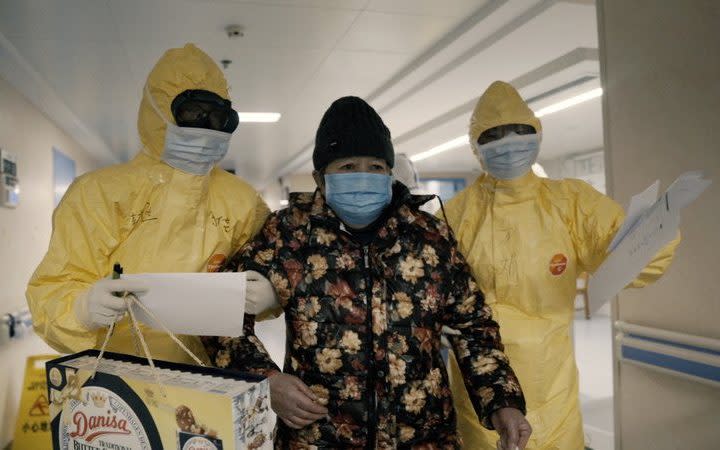76 Days vaunts the severity of Wuhan’s lockdown – but ducks the real questions

- Oops!Something went wrong.Please try again later.
Dirs: Hao Wu, Weixi Chen, anonymous. 12 cert, 93 mins.
The lockdown in the Chinese city of Wuhan, the original epicentre of the Covid-19 outbreak, ran from Thursday 23 January to Wednesday 8 April 2020. At the beginning of that 76-day period, to the world at large the measures seemed unconscionable – like a public policy cribbed from a sci-fi horror movie. By the end of it, though, the rest of us were pressed up against our own living-room windows, half-expecting to see Cillian Murphy stumbling past in a hospital gown, or a squad of chimpanzees marching down the road with machine guns.
This new documentary offers a fly-on-the-wall perspective – or a fly-on-the-ward one – of those crucial two-and-a-half months at the start of the pandemic, as they were experienced at four hospitals in the capital of Hubei province. The fact that one of its three credited directors is anonymous suggests that filming took place without government permission. But the result is less of an exposé than a straightforward video-diary, in which doctors and nurses are shown battling against a virus they aren’t even sure how to contain, let alone treat.
With no narrator, very few explanatory captions, little sense of time passing, and most of the on-screen figures clad head-to-toe in PPE, the film doesn’t make it easy for the viewer to get their bearings. The early sequences lean into the surreal, disorienting terror of the situation: the handles of locked ward doors are rattled from the outside as if by zombies, while the healthcare workers drifting up and down the corridors cut spectral figures in their white protective coveralls.
One, charged with disinfecting the personal effects of the deceased, offers an appraisal of the situation that recalls the doom-laden epigraph of Kubrick’s Barry Lyndon. “Rich or poor, reversed or despised, fate befalls all,” she muses, while all around her, the screens of mobile phones light up with messages for the dead.
Gradually, a number of storylines emerge. Most moving is the one that follows a young pregnant woman who tests positive for Covid shortly before going into labour. Within seconds of her baby being delivered, the poor mite is whisked off to another facility, where it’s tended to in an incubator by medics until its mother gets a clean bill of health. Elsewhere, a great-grandfather, possibly wrestling with dementia, keeps trying to get out of the building and go home, but the only doors he can find before being shepherded back to his bed are chained and padlocked.
One can sympathise. The film, which was constructed by Wu in America from footage provided by his China-based collaborators, is claustrophobic by design – but the longer it goes on, the less its narrowness feels like an unambiguous strength. We glean little sense of how successfully the hospitals are combating the virus, or how Wuhan at large is coping with the lockdown, beyond a few cutaways to civilians lining up to collect food parcels and the odd shot of an ambulance gliding down an empty street.
Nor is there a glimpse, or even an acknowledgement, of the city’s now-infamous wet markets where the coronavirus is thought to have initially emerged. And any discussion of the Chinese authorities’ lockdown policy itself – one you would imagine hospital employees might take a view on – is also conspicuous by its absence.
For a documentary whose big selling point is heat-of-the-moment candour, such angles don’t feel like they can be optional extras, and their absence leaves 76 Days feeling a little unmoored. Wuhan’s status as ground zero for both this horrific disease and the punishing measures adopted to suppress it comes down to more than mere cosmic bad-luck – and broader, more probing films will no doubt address this in the years ahead. For now, though, human resilience on the frontline is a very welcome thing to see.
On VOD from Friday

